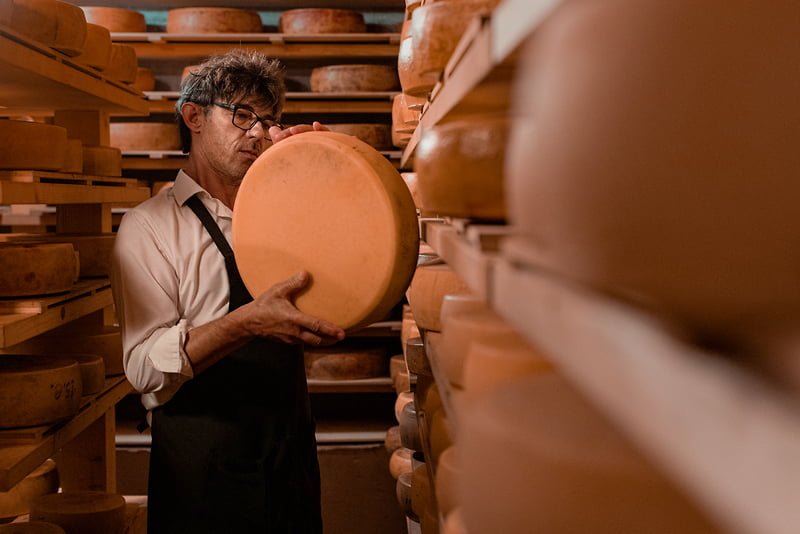Slovenian orange wines are becoming increasingly popular and famous not only in Europe but also across the “pond”. In this article we explore the tastes of the top Slovenian wine – orange wine. In Slovenia orange wines originate in the Primorska region.
Orange wines represent a relatively small, but very important niche in the global and Slovenian wine market because respect for tradition combined with modern wine production insights have proven to be a winning formula for both producers and consumers. Orange wines are well known in Slovenia.
Orange wines became popular a few decades ago, however, the orange wines are nothing new, as the first orange wines were drunk some 6,000 years ago in Georgia. The revival of this ancient process of orange wine production in Slovenia has occurred in the last twenty years.
What exactly is orange wine and how is it made?
Orange wine is a type of white wine made from white grape varieties, such as Chardonnay and Sauvignon Blanc. The difference lies in the production process – orange wines are left in contact with grape skins over a longer period of time (maceration). The same procedure is commonly used for red wine production. As they macerate with their skins, seeds, and stems (like red wines) for several weeks or even months, additional color pigments and tannins are eluted from grape skins which give the orange wines a deep orange or golden hue, hence the name.
Exploring the unique Slovenian orange wines
Orange wines in Slovenia are a unique variety of wine that is mostly grown in the Primorska wine region. Often referred to as the “fourth” color of wine, orange wine should not be confused with rosé.
In Slovenia, orange wines are produced through a special process of making white wine using techniques typically used for red wines – the same process that has gained popularity among winemakers all around the world, which involves prolonged contact with grape skins during the production process (maceration).
Winemakers in Slovenia use varying maceration times depending on the type of grape and their production philosophy, ranging from just a few days to up to half a year. Orange wines in Slovenia offer a unique flavor profile that sets them apart from other types of orange wines and are definitely worth trying.
The history of orange wines in Slovenia
Orange wines have been a popular choice for wine enthusiasts since the 1990s, but little do people know that Slovenian winemakers in the Primorska wine region were already producing this wine back in the 1980s. One of the most renowned orange wine producers in Slovenia is Aleks Klinec, who has helped to put Slovenian orange wines on the map.
With each passing year, the demand for orange wines in Slovenia continues to grow, and it’s no surprise why – these wines offer a unique taste experience that is unlike any other. But the term “orange wine” is not made up by Slovenians – it was actually given to this wine by an English sommelier. While traveling around the world, you might also hear it referred to as “amber wine” .


Where does orange wine originally come from?
Orange wines have been produced in countries like Italy and Georgia for centuries. However recently they are gaining recognition outside their traditional regions. Orange wines are becoming increasingly popular among natural winemakers who strive to keep their winemaking as minimalistic as possible by using only grapes and no additives whatsoever during production. In Georgia – the birthplace of wine – winemaking is a tradition that has earned the country a reputation as a leading producer. The use of qvevris (clay amphoras buried in soil) is widespread across Central and Western Europe.
Northern Adriatic Sea region as the world’s leading center for orange wine production
Recently, the northern Adriatic Sea region, encompassing Slovenia, Italy, and Croatia, has become one of the world’s leading centers for orange wine production. By blending age-old techniques with modern insights, many winemakers are returning to traditional winemaking methods. This area is home to some of the most well-known orange wine producers and stretches from Friuli to Istria in a sweeping arch that includes Collio, Brda, the valley of Vipava, and the Karst.
Orange wine in Slovenia originated in the valley of the Vipava and Karst wine region. Many Slovenian wine producers located in Slovenian Istria have also started to produce the orange wines. Today, many winemakers produce orange wines in all three of our wine-growing regions (Primorska, Posavje and Podravje). Among the orange pioneers are certainly the Slovenians in Italy Joško Gravner and Stanislav Radikon, Aleks Klinec, and Valter Mlečnik from the Vipava valley. There are around 60 orange wine producers in Slovenia at the moment.
Orange wines are now produced in almost all traditional European wine-growing regions such as France, Spain, Greece, Hungary, Germany, Slovakia, Czechia, Serbia and beyond. Additionally, some producers have emerged in new winegrowing regions like New Zealand and the USA.
Orange wine tasting and food pairing
The Slovenian sommeliers serve orange wines slightly warmer than a classic white, and slightly cooler than a red. Slovenian sommeliers say the best temperature for drinking orange wines is around 12ºC. It’s also perfectly acceptable to drink orange wines in Slovenia slightly cooler, around 10ºC degrees if it’s hot outside and you want them to be very refreshing.
Orange wines in Slovenia have often been described as robust and bold, with honeyed aromas of jackfruit, hazelnut, bruised apple, wood varnish, linseed oil, juniper, sourdough, and dried orange rind. On the palate, orange wines in Slovenia are big, dry, and even have tannin like a red wine with a sourness similar to fruit beer.

Because of their boldness, orange wines pair excellently well with equally bold foods, including curry dishes, Moroccan cuisine, Ethiopian cuisine, Korean dishes with fermented kimchi, and traditional Japanese cuisine.
Due to the high phenolic content (tannin and bitterness) and the nutty tartness they exhibit, orange wines pair with a wide variety of meats, ranging from beef to fish. Orange wines can also be paired with more traditional meals of the surrounding region.
Orange wine festival in Slovenia
Orange wines are still rare, but many countries like Slovenia have a growing interest in this natural winemaking style. The popularity of orange wines in Slovenia has rapidly grown over the last couple of years, hence there is a whole festival dedicated to this variety of top Slovenian wine.

The next Orange Wine Festival will be held in Izola, Slovenia on the 28th of April 2023. Save the date!
Learn more about the festival here.
Which are Slovenian orange wines or amber wines?
| Atimo – Filip Koletnik |
| Batič |
| Blažič |
| Bordon |
| Burja |
| Butul |
| Cigoj |
| Čotar |
| Ducal |
| Gordia |
| Guerilla |
| Heaps Good Wine |
| Jakončič |
| JNK |
| Kabaj |
| Keltis |
| Klabjan |
| Klinec |
| Kmetija Štekar |
| Kobal – Bajta |
| Korenika Moškon |
| Kramar |
| Kukanja |
| Mlečnik |
| Movia |
| Nando |
| Organic Anarchy (Aci Urbajs) |
| Petrič |
| Povh |
| Rojac |
| Santei |
| Slavček |
| Šoster |
| Štekar |
| Štemberger |
| Šturm |
| Švara – Kmetija Brajda Komen |
| Tavcar |
| UOU |
| Uvaia |
| Zaro |
| Zorjan |

Which are Slovenian orange sparkling wines?
Amongst the best Slovenian orange sparkling wines we know Fedora, Keltis, Gordia and Štemberger.
Which are Slovenian orange wines across the border?
The so-called “Zamejski Slovenci” are also known for their outstanding Slovenian orange wine production such as Gravner, Kante, Radikon, Terpin, Prinčič, Vodipivec, Paraschos, Kante, Primosic, Zidarich, Škerlj, Damjan Podversic, and more.
Best Slovenian orange wine in the world
Slovenian biodynamical producer Zorjan’s amazing muškat otonel Dolium is best rated Orange wine in the world in July’s Decenter issue of 30 best orange wines in the world. Third place also goes to Slovenia when it comes to the best orange wine, Vina Blazic rebula selekcija.


The Slovenia Wine – Discovery Box
Available only in Europe!
Source: Orange Wine Festival & Wine Folly




















